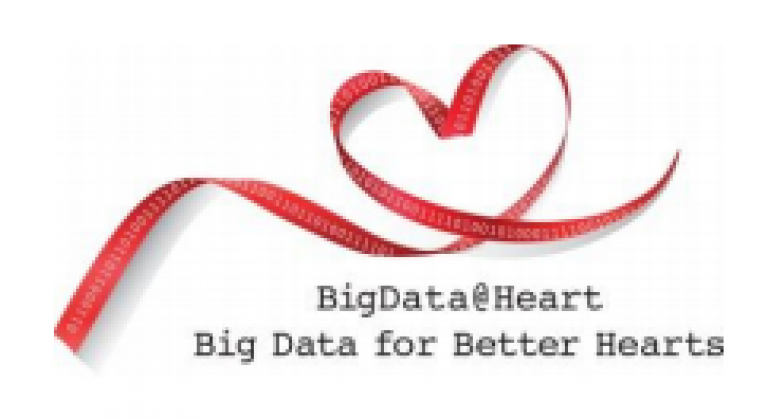Big Data for Better Hearts
10 July 2017

The objective of BigData@Heart is to develop a data-driven translational research platform of unparalleled scale and phenotypical resolution, with the aim to improve patient outcomes and reduce societal burden of atrial fibrillation (AF), heart failure (HF) and acute coronary syndrome (ACS).
AF, HF and ACS are major drivers of cardiovascular disease (CVD), which causes more than 3.9 million deaths each year across Europe – accounting for 45% of all deaths (49% of deaths among women and 40% of deaths among men) – with 1.3 million of these deaths occuring before the age of 75 years. Of the total cost of CVD in the EU (€210 billion a year), around 53% (€111 billion) is due to health care costs, 26% (€54 billion) to productivity losses and 21% (€45 billion) to the informal care of people with CVD.
Currently, the management of AF, HF and ACS is complicated by their complex aetiology and heterogeneous prognoses. This renders the response to therapy unpredictable, with large variations amongst individuals and, importantly, small or undetectable treatment effects in large patient trials. Also, tolerability of medications and adherence to current treatments shows wide variations. Aside from the medical need, drug development pipelines from early target validation through to late post-marketing work have proven to be slow and high-risk. The lack of high-resolution biomarkers and computable definitions frustrates progress in the development of successful CVD therapies. There is a clear need for a better definition of CVD through improved biomarkers and endpoints, as well as its outcomes and prognoses.
BigData@Heart uniquely brings together key players and stakeholders in the CVD field to address these challenges. The clinical researchers involved have been instrumental in shaping current AF, HF and ACS treatment and management in Europe. They will join forces with leading epidemiologists, big data scientists, leading cardiovascular practitioners, pharmaceutical industry scientists, experts in ethics and legal aspects, and patient organisations from across Europe. The BigData@Heart consortium will develop a data-driven translational research platform which will be aiming at delivering clinically relevant disease phenotypes, scalable insights from real-world evidence, best-practices in drug development, and personalised medicines through advanced analytics.
For the first time, BigData@Heart will assemble European-wide consented cohorts (conventional research data), electronic health records (EHRs) in population settings (e.g. CALIBER, ABUCASIS, MONDRIAAN), hospital based EHRs, disease quality improvement registries (e.g. SWEDEHEART, NICOR, SwedeHF), clinically recorded imaging data, and trial data (covering over 75,000 patients).
BigData@Heart will deliver population relevant disease-based datasets (with > 5 million cases of HF, AF and ACS and healthy population cohorts > 16 million people accruing a further > 500,000 cases on follow up) and phenotypic depth with biomarker, behavioural, clinical, imaging data and genomic information with genome-wide association study (GWAS) consortia in each disease (AFGen, HERMESHF, GENIUS-CHD). This project will develop and test a framework that will enable big data driven cardiovascular research, including the development of:
- New definitions of diseases and outcomes that are universal, computable, and relevant for patients, clinicians, industry and regulators.
- Informatics platforms that link, visualise and harmonise data sources of varying types,
- completeness and structure.
- Data science techniques to develop new definitions of disease, identify new phenotypes, and construct personalized predictive models.
- Guidelines that allow for cross-border usage of big data sources acknowledging ethical and legal constraints as well as data security.
The ultimate expected impact of BigData@Heart on science, industry, policies, and patients includes a better understanding of heart disease, the development of new therapy targets, improved drug and device development/utilisation, and laying a scientific foundation for progress in the personalised treatment and management of CVD.
BigData@Heart is a 5-year, €19 million project supported by the Innovative Medicines Initiative (IMI), a public-private partnership between the European Union and the European pharmaceutical industry. The pharmaceutical industry contributes half of BigData@Heart’s budget, while the other half is funded by the European Commission. BigData@Heart Structure and Participants:
The consortium is being jointly led by Prof. Diederick E. (Rick) Grobbee from the University Medical Center Utrecht (UMCU) and Dr. Gunnar Brobert from Bayer and consists of 19 partners coming from academia, medical associations, pharmaceutical industry, SMEs and patient organisations:
- University Medical Center Utrecht (UMCU)
- Charité - Universitätsmedizin Berlin (Charité)
- European Society of Cardiology (ESC)
- European Heart Network (EHN)
- University College London (UCL)
- University of Cambridge (CAM)
- International Consortium for Health Outcomes Measurement (ICHOM)
- Fundación para la investigación del Hospital Clinico de la Comunidad Valenciana (INCLIVA)
- Karolinska Institutet (KI)
- Universitätsklinikum Hamburg-Eppendorf (UKE)
- MLC Foundation (MLCF)
- University of Birmingham (BHAM)
- Uppsala Clinical Research Center, Uppsala University (UCR)
- BAYER (BAY)
- NOVARTIS (NOR)
- SERVIER (SER)
- SomaLogic (SOM)
- Vifor Pharma (VP)
- The Hyve (HYVE)
For more information visit: www.bigdata-heart.eu
 Close
Close

